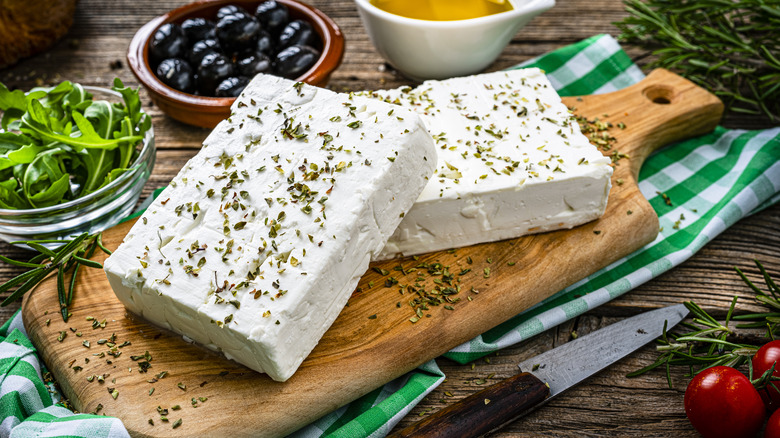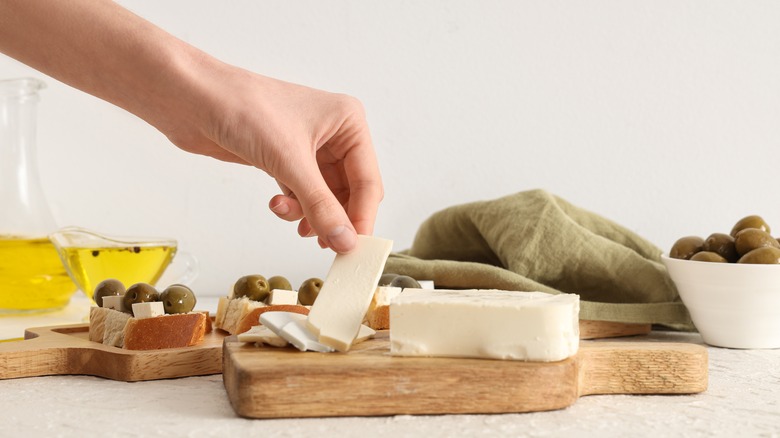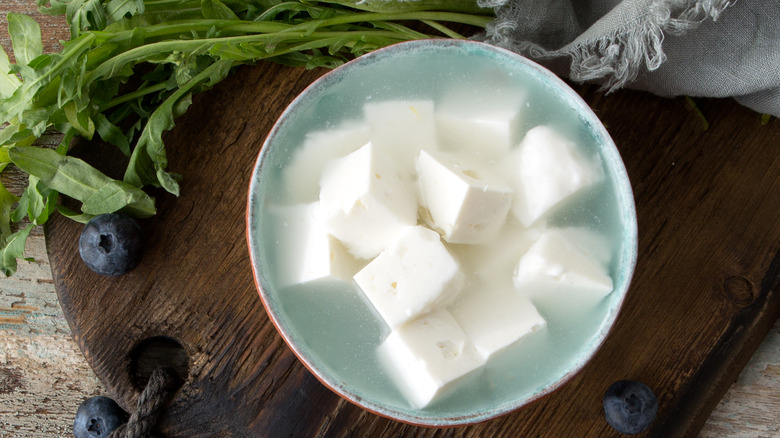The Easy-To-Make Mistake That's Ruining Your Feta Cheese
When it comes to the shelf life of fresh cheese, feta can feel like a little bit of a gray area. If you don't manage to eat it all in one meal or recipe, you have about a week to eat it up once the package is opened. The trouble is, sometimes feta seems to go bad faster than seven days — what gives? The most likely culprit is you, unfortunately. Touching fresh feta with your hands transfers microbes onto the cheese and into the brine, which can cause it to go bad.
It should go without saying that you should always wash your hands before you touch any food, but it's especially true when it comes to fresh cheese like feta, which is a pickled curd variety. Every cheese is made by carefully fermenting milk with specific bacteria in a very sterile, controlled environment. Your hands, like it or not, are covered with all kinds of microorganisms that will happily move right in when introduced to a cheesy environment, especially fresh varieties like feta. To keep your crumbles and blocks in tip top shape, don't touch fresh cheese with your bare hands unless you're going to eat all of it. Instead, use a clean utensil or plastic barrier to touch your cheese.
Use tongs and plastic to handle feta
If you've ever visited a cheese factory, or at least watched a video of one online, you'll notice that everyone dresses in disposable, sterile suits and wears gloves. This is because milk is an ideal environment for growing bacteria. This isn't necessarily a bad thing because cheesemakers need certain types of bacteria (like streptococcus thermophilus and lactobacillus) to make the cheese in the first place. But unless the environment is tightly controlled, all kinds of other tiny organisms can take off too and ruin the cheese. Keep this in mind when you're handling the dairy product at home.
You don't need to get dressed up in a space suit to handle your feta (or any other cheese) at home, of course. Most of the time you'll probably eat it all before it goes bad. However, the fresh variety will last a lot longer if you only touch what you plan to eat since even if you wash your hands well, there could be some extra yeast, mold, or bacteria lingering around. If you're making a recipe that includes feta, snap on a rubber or plastic glove before you fish the block out of the brine, or use a clean utensil. If you're planning to crumble it up, place the block in a clean plastic bag and crush it up inside instead of using your bare hands.
Store feta in a brine
Your other secret weapon for storing feta is the brine that comes with the package. The salty solution isn't there just for flavor. It also staves off bacteria, so don't dump it down the drain before all the cheese is eaten. Keep in mind, however, that brine isn't some sort of magical solution that kills bacteria like bleach. It just slows things down, so don't stick your bare fingers into the brine, either. Fish the cheese out of the brine with clean tongs, or use a slotted spoon to keep the brine clean.
If your block of feta is sold without brine or not enough, and you can't eat it all in one sitting, you can make your own by mixing a solution of 1 teaspoon of salt with 1 cup of water. Sink any leftover cheese into the salty mixture, and you should be able to keep your cheese in the refrigerator for up to a month. Alternatively, you can also preserve feta by submerging it in olive oil.
Feta crumbles, on the other hand, which are typically sold in a container without brine, should be eaten within a week once you open the container. It's not practical to dunk crumbles in a salty brine because they'll be hard to fish out, and typically they're packaged that way to make it convenient to eat the cheese, so go ahead and use it up while it's fresh.


